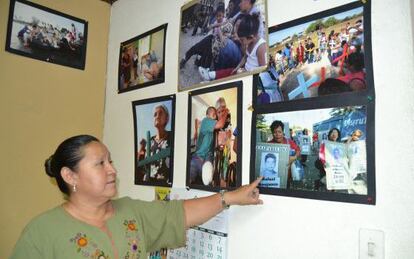“The borders are the cemeteries of immigrants”
The mother of a missing Salvadoran man has founded an NGO to help search for migrants

Anita Zelaya’s son left for the United States on May 2, 2002. He hoped to find a job to help his family get out of poverty thanks to the money he would send back home. Anita knows that he traveled across Guatemala and arrived in Mexico – where he disappeared. “I never heard anything else from him,” she says. “I’ve been looking for him ever since. Every day. I haven’t stopped looking for him.” Hundreds of people like her are searching for family members who have gone missing on their journey to fulfill the “American Dream.” For many, it has turned into a big nightmare.
Rafael Alberto Rolin Zelaya was 22 years old when he left El Salvador. “He left just like many of our young people and now even minors go there as undocumented immigrants,” Zelaya says. She has since traveled in the migrant’s footsteps, from Guatemala to the American-Mexican border, scrutinizing every corner in search of her son. “I started to look for him by myself. As a mother, I have been fighting to find out what happened to my son and I am not giving up. I have reached out to the government, the ministry of foreign affairs, the international police [Interpol], the hostels and to various civil organizations working to help immigrants.”
Once the modest homemaker from a poor family, Zelaya is now a very active figure on social issues. In 2006, she founded The El Salvador Committee for Families of Dead and Missing Migrants (Cofamide). The organization operates thanks to Mexican and Canadian patrons. “We get funding for our local office in San Salvador where we receive the reports of missing persons. We have had 350 cases” since the foundation began operating. “Some of these cases have been solved because of our efforts. Some of them – few of them – were found alive. In other cases, we have obtained proof of death through DNA testing.”
I have been fighting to find out what happened to my son and I am not giving up”
“The discovery of corpses in mass graves near the Texas border, particularly in Falfurrias, lead to visits to our foundation because the fathers, mothers and brothers of the missing always have hope that they might find their relatives. But, it’s worth noting that Mexico’s borders – in the south and in the north – are cemeteries for Mexican, Guatemalan, Honduran and Salvadoran migrants.”
Luis Alberto López, who co-founded the organization, is the man responsible for the search for missing persons. His brother, Juan Carlos disappeared in 2001 when he was 24 years old. “I have been looking for my brother for 13 years,” he says. “The last time I heard something about him was when the coyote – that’s what we call those who smuggle migrants – phoned us to say that Juan Carlos had passed. We haven’t heard anything else since.”
The coyotes currently charge between $5,000 and $7,000 to take a migrant to the American border. The business is profitable. They charge half the money in El Salvador and the other half on American soil. According to reports from Salvadoran authorities, about 500 people start this journey every day. Half of them are teenagers.
“We have heard different versions of what happened to my brother. He fought with the coyote and so the smuggler left him behind. They also say the small boat he left in was probably carrying drugs and that now he may be in a Mexican prison. But it’s hard to locate him because he was undocumented.” López says that in 2013 he got access to some prisons in Tapachula and Oaxaca thanks to the caravan of Central American mothers, a search party looking for missing sons. “In Oaxaca, we located several Salvadorans who were not in touch with their families,” he adds. But, there was no trace of his brother.
The fathers, mothers and brothers of the missing always have hope that they might find their relatives”
Cofamide is currently working on 244 cases. In each case, family members have made an official missing person’s report and taken DNA tests. These results are checked against those of the bodies found in secret graves or buried as unidentified persons in local cemeteries.
López sheds light on the situation undocumented migrants face. Many of them die in the crossfire of drug-related wars. “Some of them are even buried in what are now called ‘narcograves’, even if they were not involved in drugs... There are many accounts from migrants who say they crossed paths with drug traffickers, and sometimes there were skirmishes and casualties – some of the migrants then end up in ‘narcograves.’ It’s just another part of our suffering.”
Translation: Dyane Jean François
Tu suscripción se está usando en otro dispositivo
¿Quieres añadir otro usuario a tu suscripción?
Si continúas leyendo en este dispositivo, no se podrá leer en el otro.
FlechaTu suscripción se está usando en otro dispositivo y solo puedes acceder a EL PAÍS desde un dispositivo a la vez.
Si quieres compartir tu cuenta, cambia tu suscripción a la modalidad Premium, así podrás añadir otro usuario. Cada uno accederá con su propia cuenta de email, lo que os permitirá personalizar vuestra experiencia en EL PAÍS.
En el caso de no saber quién está usando tu cuenta, te recomendamos cambiar tu contraseña aquí.
Si decides continuar compartiendo tu cuenta, este mensaje se mostrará en tu dispositivo y en el de la otra persona que está usando tu cuenta de forma indefinida, afectando a tu experiencia de lectura. Puedes consultar aquí los términos y condiciones de la suscripción digital.








































